
Originally stolen from an Auburn biology lab, I think. Went for six dollars.
And here I thought college parties weren’t worthwhile.

Originally stolen from an Auburn biology lab, I think. Went for six dollars.
And here I thought college parties weren’t worthwhile.




Sir Doyle’s original vision was realized over a century later.
But hey, that’s cool. I don’t mind the ninja fights and artillery shells turning trees into toothpicks so long as they’re mysterious. Not that A Game of Shadows doesn’t have case-solvin’ – there’s a ton of it – but Holmes seems to do all that stuff without us. When things settle down once in a while, Holmes goes, “Hey guys, I have an elaborate conclusion to tell you! There were all these clues, but I guess you didn’t even get to see because you were jumping trains and dodging gatlin gun fire.”
Good thing the audience has Holmes to solve the mystery for us while we’re busy trying not to get exploded.
But the narrative’s biggest trouble probably is that Holmes and his pals can’t seem to stay in the same country for more tan ten minutes. It’s hard for all the clues, characters, and threads to hang together if every turning point sends us across a continent.

So don’t bother trying to figure it out. Holmes is just going to call on a bunch of stuff the movie never bothered to show you in the first place, and a lot of it is so outrageous that you wouldn’t have thought of it anyway. But he makes it look easy. Holmes is the Bob Ross of detectives.
But hey, Bob Ross was pretty cool!

Does anybody remember this? (comment. you people never comment.)
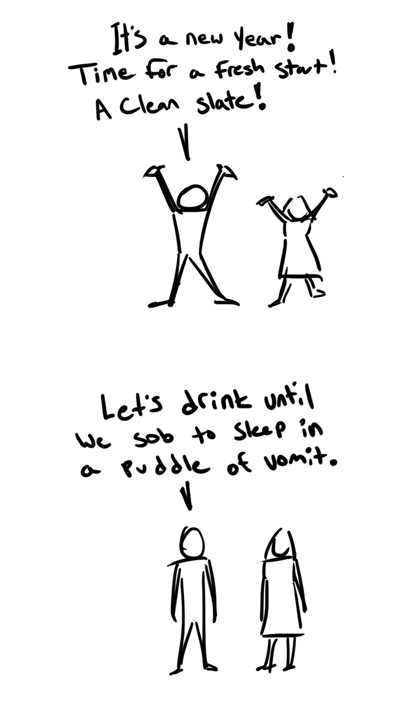
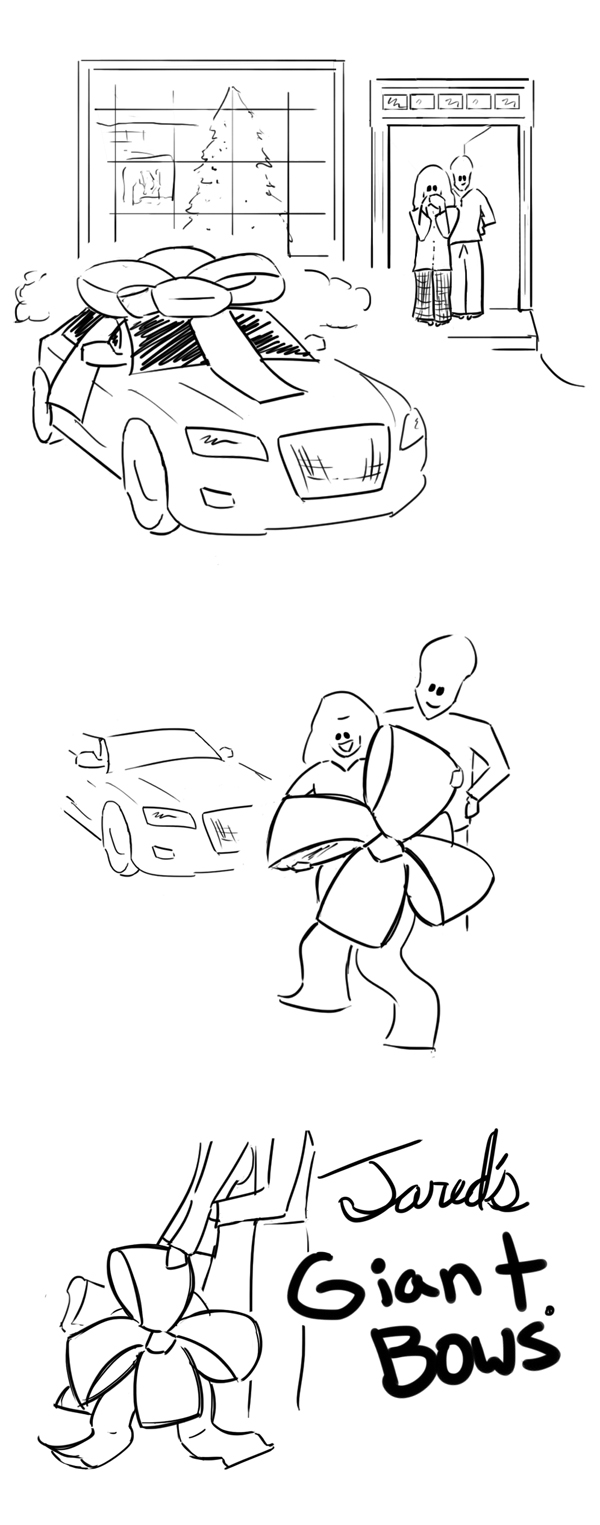

I write theatre reviews for Bama’s student newspaper, The Crimson White. I do it because if I always do a little bit of everything, I never get anything too hard or too important.
Let me explain my position.
Reviewing student theatre is more interesting than I thought. I’m not a theatre student, but I tooled around enough with the drama kids in high school to wing it. See, in my drama days at George Washington High School, when talking about what we did, we generally used two adjectives:

And

Our entire descriptive lexicon consisted of positive superlatives, meaning that anything anyone did on stage was a monumental achievement in art.
…for our own department. We judged other schools by a standard in which the highest point was mediocrity. But, of course, the feelings were mutual. So my senior year when both George Washington High and East High did Macbeth, it played out like this:
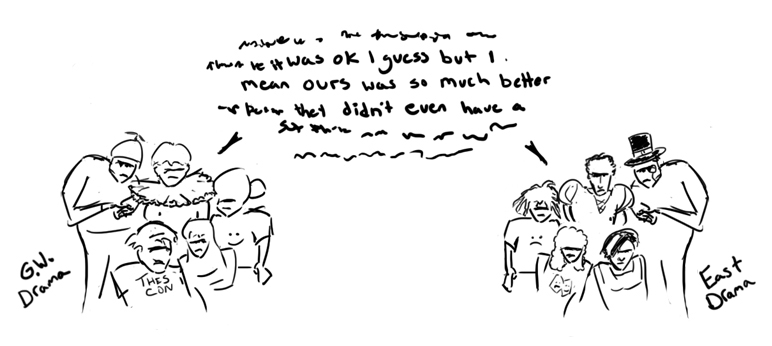
(Our Macbeth was gender-reversed. I played a witch. It was fun.)
This happens because every student show is the entire department’s baby. Even if you aren’t acting, directing, designing, stage managing, on tech crew, ushering, or doing publicity, odds are your BFF (theatre kids generally have five or six of these) is acting, directing, designing, stage managing, on tech crew, ushering, or doing publicity.
…and everyone worked so hard and I love everyone so much and you were all AMAZING!!
People grow out of this in college theatre. The competition is stiffer and there are more aspiring careers and less “gonna go out for Desdemona because I’ll maybe get to kiss Mike Skeen.” But college is still just one step away from high school, so there’s a lot of that DNA in the mix, too.
I reviewed our own Animal Crackers, a Marx Brothers farce from the 30’s. It was alright. It had troubles, but it was alright. The review said it was alright. In fact, the editors headlined it “Animal Crackers maintains constant laughs.” But this didn’t set well for those fresh off the boat from high school theatre, a place in which “alright” is the word for “contagious skin disease.”
I know this because I have a mole inside the theatre department. I don’t hear from any other theatre people because you don’t talk to the enemy. But, of course, people outside the department don’t read them, bless their hearts. So the reactions to my reviews usually look like this:
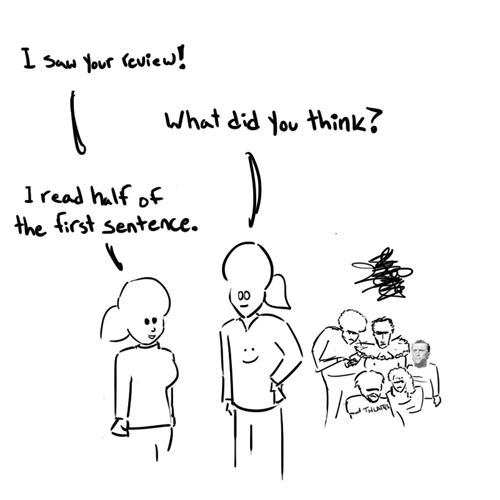
Now lets cut to UA’s second to last show, City of Angels, a clever little musical by the guy behind A Funny Thing Happened on the Way to the Forum. I thought it was my worst-written review yet. I took notes, but it’s hard to take notes in the dark and still pay attention to what’s happening.
Trying to read my handwriting afterward produced these translations:
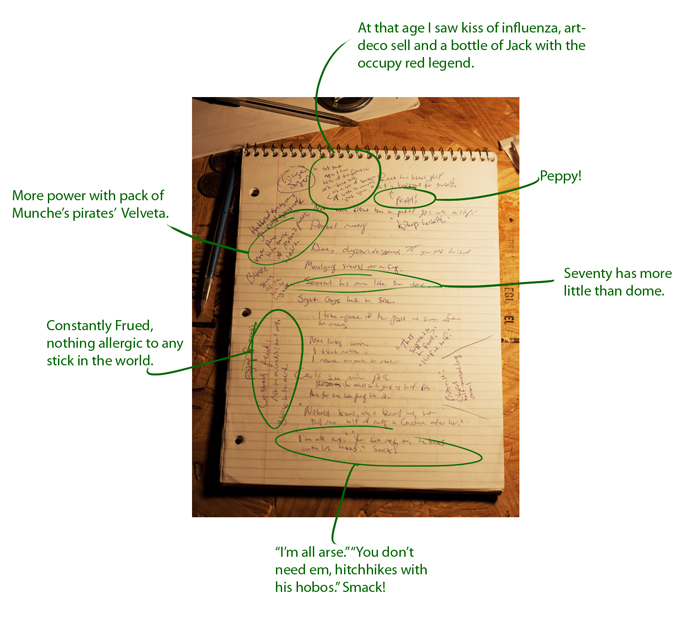
So on these notes I rattled the thing off in one draft. It wasn’t particularly clever, and was packed with jargon and references to past shows I was sure would get zombie-eyes from everyone but theatre students (which is a small market) and theatre-goers (which is even smaller.)
Except this one didn’t just vanish into the student journalism ether. In fact, the reaction was stunning. Not that the reaction itself was surprising – though it was, mind you – but the fact that it got a reaction at all. My secret theatre mole messaged me and said that it was my best one yet. I didn’t agree, but hey, maybe that meant the theatre folks weren’t so upset. But then regular people started to mention it, too. An old professor in the Starbucks line said, with devious a grin, that I was a harsh critic. But another professor told me the show sounded great and he would be sure to “yuk it up.” My roommate Chris actually decided to go because of the review.
The web version even got a comment. I never get comments! I write things, put them in the paper, you don’t read the paper, and we all forget. That was the system. You’re all really screwing with my balance here!
But I started to figure it out when someone told me it read like a review in Time magazine. He was right, though I had it pegged for a New York Times review. There was a reason I didn’t try to write reviews like the Times. I figured Times reviews were for rich, white, old, educated, New Englanders, while I wrote for a community in which I sold a college football ticket for $400. (I actually told the NY Times about it.)
I was worried that when I wrote this:

…my engineering major friend saw this:

Or so I thought.
You see, the reaction to City of Angels got me thinking. What if average UA kids don’t want reviews that are accessible, or funny, or easy going down – everything my review wasn’t. Why would they? They don’t care about theatre. But maybe, just maybe, they want to care about theatre. Maybe all they want are reviews that sound like Time magazine, reference past shows, and throw around stage jargon because it makes our department sound real. Maybe the people want to think that, instead of cute fodder for grandparents there’s a legitimate artistic organization, and instead of a collection of misfit drama kids, there’s a community of devoted, professionally-minded performers.
Maybe the only one who needed to respect the drama kids was me.
…or maybe they just liked the joke about those two shows hooking up.



The one character in Immortals that tried diplomacy got decapitated. Did he even see 300?